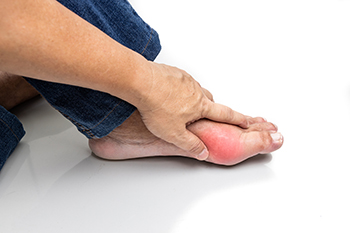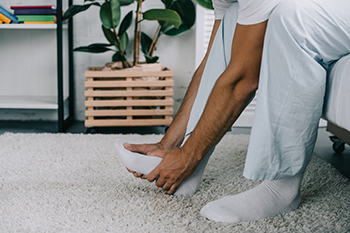June 2024
What is Achilles Tendinopathy?
 Achilles tendinopathy is a condition characterized by pain, swelling, and stiffness in the Achilles tendon, which connects the calf muscles to the heel bone. This condition often results from overuse, particularly in athletes and individuals who engage in repetitive activities such as running or jumping. It can also arise from a sudden increase in physical activity, wearing poor footwear, or biomechanical issues like flat feet. The pain associated with Achilles tendinopathy usually starts as a mild ache above the heel or in the back of the leg, worsening with activity. The condition can range from mild inflammation to more severe degeneration of the tendon fibers. Diagnosis typically involves a physical examination and imaging tests, such as ultrasound or MRI scans to assess the extent of the damage. Treatment options include rest, targeted exercises, and nonsteroidal anti-inflammatory drugs. In severe cases, surgery may be required to repair the tendon. Preventative measures include proper warm-up routines, wearing appropriate footwear, and gradually increasing the intensity of physical activity. If you experience symptoms of Achilles tendinopathy, it is suggested that you schedule an appointment to see a podiatrist for an accurate diagnosis and effective treatment plan.
Achilles tendinopathy is a condition characterized by pain, swelling, and stiffness in the Achilles tendon, which connects the calf muscles to the heel bone. This condition often results from overuse, particularly in athletes and individuals who engage in repetitive activities such as running or jumping. It can also arise from a sudden increase in physical activity, wearing poor footwear, or biomechanical issues like flat feet. The pain associated with Achilles tendinopathy usually starts as a mild ache above the heel or in the back of the leg, worsening with activity. The condition can range from mild inflammation to more severe degeneration of the tendon fibers. Diagnosis typically involves a physical examination and imaging tests, such as ultrasound or MRI scans to assess the extent of the damage. Treatment options include rest, targeted exercises, and nonsteroidal anti-inflammatory drugs. In severe cases, surgery may be required to repair the tendon. Preventative measures include proper warm-up routines, wearing appropriate footwear, and gradually increasing the intensity of physical activity. If you experience symptoms of Achilles tendinopathy, it is suggested that you schedule an appointment to see a podiatrist for an accurate diagnosis and effective treatment plan.
Achilles tendon injuries need immediate attention to avoid future complications. If you have any concerns, contact one of our podiatrists of Advanced Foot & Ankle Associates, PLLC. Our doctors can provide the care you need to keep you pain-free and on your feet.
What Is the Achilles Tendon?
The Achilles tendon is a tendon that connects the lower leg muscles and calf to the heel of the foot. It is the strongest tendon in the human body and is essential for making movement possible. Because this tendon is such an integral part of the body, any injuries to it can create immense difficulties and should immediately be presented to a doctor.
What Are the Symptoms of an Achilles Tendon Injury?
There are various types of injuries that can affect the Achilles tendon. The two most common injuries are Achilles tendinitis and ruptures of the tendon.
Achilles Tendinitis Symptoms
- Inflammation
- Dull to severe pain
- Increased blood flow to the tendon
- Thickening of the tendon
Rupture Symptoms
- Extreme pain and swelling in the foot
- Total immobility
Treatment and Prevention
Achilles tendon injuries are diagnosed by a thorough physical evaluation, which can include an MRI. Treatment involves rest, physical therapy, and in some cases, surgery. However, various preventative measures can be taken to avoid these injuries, such as:
- Thorough stretching of the tendon before and after exercise
- Strengthening exercises like calf raises, squats, leg curls, leg extensions, leg raises, lunges, and leg presses
If you have any questions please feel free to contact one of our offices located in Lake Worth and Aledo/Willow Park, TX . We offer the newest diagnostic tools and technology to treat your foot and ankle needs.
Finding Running Shoes for Your Child

Finding the perfect pair of running shoes for your child involves more than just picking the trendiest style off the shelf. It's about ensuring that their feet are properly supported and protected, especially during their active play and sports activities. Look for features, such as arch support, a shock-absorbing sole, firm heel support, and easy-to-fasten closures like laces or Velcro. Prioritize fit by having your child's feet measured for both length and width, and make sure they try on several pairs to find the best match for their foot shape. Remember that shoe sizes can vary between brands, so focus on how the shoe feels rather than the number on the label. Pay attention to details like toe wiggle room, snug yet comfortable heel fit, and proper alignment of the ball of the foot. And don't forget, a good shoe should feel comfortable right from the start. There shouldn't be a need to break them in. If you're unsure about the fit or need help with a specific foot problem, it is suggested that you make an appointment with a podiatrist who can offer tailored recommendations based on your child's specific needs.
The health of a child’s feet is vital to their overall well-being. If you have any questions regarding foot health, contact one of our podiatrists of Advanced Foot & Ankle Associates, PLLC. Our doctors can provide the care you need to keep you pain-free and on your feet.
Tips for Keeping Children's Feet Healthy
- Make sure their shoes fit properly
- Look for any signs of in-toeing or out-toeing
- Check to see if they have Clubfoot (condition that affects your child’s foot and ankle, twisting the heel and toes inward) which is one of the most common nonmajor birth defects.
- Lightly cover your baby’s feet (Tight covers may keep your baby from moving their feet freely, and could prevent normal development)
- Allow your toddler to go shoeless (Shoes can be restricting for a young child’s foot)
- Cut toenails straight across to avoid ingrown toenails
- Keep your child’s foot clean and dry
- Cover cuts and scrapes. Wash any scratches with soap and water and cover them with a bandage until they’ve healed.
If you have any questions, please feel free to contact one of our offices located in Lake Worth and Aledo/Willow Park, TX . We offer the newest diagnostic and treatment technologies for all your foot care needs.
Gout's Impact on Foot Health

Gout, a form of inflammatory arthritis, can wreak havoc on foot health, causing intense pain, swelling, and stiffness. It often impacts the big toe first. It occurs when uric acid levels in the blood rise, leading to the formation of sharp urate crystals in the joints, often targeting the big toe joint. These crystals trigger sudden and severe bouts of pain, known as gout attacks, which can make walking and even wearing shoes unbearable. Managing gout involves dietary changes to help control uric acid levels. Foods rich in purines, such as red meat, organ meats, and shellfish, should be limited, as they can exacerbate gout symptoms. Conversely, incorporating plenty of fruits, vegetables, whole grains, and low-fat dairy products into the diet can help lower uric acid levels and reduce the frequency and severity of gout attacks. Staying hydrated by drinking plenty of water is also vital for flushing out uric acid from the body. If you have pain in your big toe and surrounding areas, it is suggested that you consult a podiatrist who can diagnose, treat, and offer additional nutritional tips to manage gout.
Gout is a foot condition that requires certain treatment and care. If you are seeking treatment, contact one of our podiatrists from Advanced Foot & Ankle Associates, PLLC. Our doctors will treat your foot and ankle needs.
What Is Gout?
Gout is a type of arthritis caused by a buildup of uric acid in the bloodstream. It often develops in the foot, especially the big toe area, although it can manifest in other parts of the body as well. Gout can make walking and standing very painful and is especially common in diabetics and the obese.
People typically get gout because of a poor diet. Genetic predisposition is also a factor. The children of parents who have had gout frequently have a chance of developing it themselves.
Gout can easily be identified by redness and inflammation of the big toe and the surrounding areas of the foot. Other symptoms include extreme fatigue, joint pain, and running high fevers. Sometimes corticosteroid drugs can be prescribed to treat gout, but the best way to combat this disease is to get more exercise and eat a better diet.
If you have any questions please feel free to contact one of our offices located in Lake Worth and Aledo/Willow Park, TX . We offer the newest diagnostic and treatment technologies for all your foot and ankle needs.
Wounds That Don't Heal Need to Be Checked
Foot Health Can Be a Reflection of Overall Wellness

Foot health serves as a silent communicator, often revealing underlying issues within the body. Foot cramps, seemingly innocuous, can indicate dehydration or nutrient deficiencies, while swollen feet may signify heart, kidney, or circulatory problems. Cold feet could be a sign of poor circulation or thyroid dysfunction, requiring attention to prevent further complications. Similarly, tingling sensations in the feet may point to a pinched nerve elsewhere in the body. Ignoring these signals can lead to developing health issues over time. Paying attention to foot health is thus imperative, not just for comfort but for overall well-being. Regular foot care, including proper footwear, moisturizing, and gentle exercises, can promote circulation and alleviate discomfort. However, if symptoms persist, it is suggested that you consult a podiatrist for an accurate diagnosis and appropriate treatment.
When dealing with systemic disease of the feet, it is extremely important to check the affected areas routinely so that any additional problems are caught quickly. If you have any concerns about your feet and ankles contact one of our podiatrists from Advanced Foot & Ankle Associates, PLLC. Our doctors will assist you with all of your podiatric needs.
Systemic Diseases of the Feet
Systemic diseases affect the whole body, and symptoms usually are displayed in the feet. This condition can make a patient’s ability to walk unbearable. Systemic diseases include gout, diabetes mellitus, neurological disorders, and arthritis.
Gout – is caused by an excess of uric acid in the body. Common symptoms include pain, inflammation, and redness at the metatarsal/phalangeal joint of the base big toe. Gout can be treated by NSAIDs to relieve pain and inflammation, and other drugs that lower the acid levels in the body.
Diabetes mellitus – is an increase in the level of blood sugar that the body cannot counteract with its own insulin. Failure to produce enough insulin is a factor in Diabetes.
Diabetes of the Feet
Diabetic Neuropathy – may lead to damaged nerves and affect the feet through numbness and loss of sensation.
Peripheral Vascular Disease – can restrict the blood flow to the feet, and often times lead to amputation of the feet.
If you have any questions please feel free to contact one of our offices located in Lake Worth and Aledo/Willow Park, TX . We offer the newest diagnostic and treatment technologies for all your foot and ankle needs.
Blog Archives
- March 2025
- February 2025
- January 2025
- December 2024
- November 2024
- October 2024
- September 2024
- August 2024
- July 2024
- June 2024
- May 2024
- April 2024
- March 2024
- February 2024
- January 2024
- December 2023
- November 2023
- October 2023
- September 2023
- August 2023
- July 2023
- June 2023
- May 2023
- April 2023
- March 2023
- February 2023
- January 2023
- December 2022
- November 2022
- October 2022
- September 2022
- August 2022
- July 2022
- June 2022
- May 2022
- April 2022
- March 2022
- February 2022
- January 2022
- December 2021
- November 2021
- October 2021
- September 2021
- August 2021
- July 2021
- June 2021
- May 2021
- April 2021
- March 2021
- February 2021
- January 2021
- December 2020
- November 2020
- October 2020
- September 2020
- August 2020
- July 2020
- June 2020
- May 2020
- April 2020
- March 2020
- February 2020
- January 2020
- December 2019
- November 2019
- October 2019
- September 2019
- August 2019
- July 2019
- June 2019
- May 2019
- April 2019
- March 2019
- February 2019
- January 2019
- December 2018
- November 2018
- October 2018





